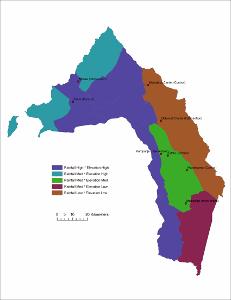Focal point
Location
About IFPRI
The International Food Policy Research Institute (IFPRI) provides research-based policy solutions to sustainably reduce poverty and end hunger and malnutrition in developing countries. Established in 1975, IFPRI currently has more than 500 employees working in over 50 countries. It is a research center of theCGIAR Consortium, a worldwide partnership engaged in agricultural research for development.
Vision and Mission
IFPRI’s vision is a world free of hunger and malnutrition. Its mission is to provide research-based policy solutions that sustainably reduce poverty and end hunger and malnutrition.
What We Do
Research at IFPRI focuses on six strategic areas:
- Ensuring Sustainable Food Production: IFPRI’s research analyzes options for policies, institutions, innovations, and technologies that can advance sustainable food production in a context of resource scarcity, threats to biodiversity, and climate change. READ MORE
- Promoting Healthy Food Systems: IFPRI examines how to improve diet quality and nutrition for the poor, focusing particularly on women and children, and works to create synergies among the three vital components of the food system: agriculture, health, and nutrition. READ MORE
- Improving Markets and Trade: IFPRI’s research focuses on strengthening markets and correcting market failures to enhance the benefits from market participation for small-scale farmers. READ MORE
- Transforming Agriculture: The aim of IFPRI’s research in this area is to improve development strategies to ensure broad-based rural growth and to accelerate the transformation from low-income, rural, agriculture-based economies to high-income, more urbanized, and industrial service-based ones. READ MORE
- Building Resilience: IFPRI’s research explores the causes and impacts of environmental, political, and economic shocks that can affect food security, nutrition, health, and well-being and evaluates interventions designed to enhance resilience at various levels. READ MORE
- Strengthening Institutions and Governance: IFPRI’s research on institutions centers on collective action in management of natural resources and farmer organizations. Its governance-focused research examines the political economy of agricultural policymaking, the degree of state capacity and political will required for achieving economic transformation, and the impacts of different governance arrangements.
Research on gender cuts across all six areas, because understanding the relationships between women and men can illuminate the pathway to sustainable and inclusive economic development.
IFPRI also leads two CGIAR Research Programs (CRPs): Policies, Institutions, and Markets (PIM) andAgriculture for Nutrition and Health (A4NH).
Beyond research, IFPRI’s work includes partnerships, communications, and capacity strengthening. The Institute collaborates with development implementers, public institutions, the private sector, farmers’ organizations, and other partners around the world.
Resources
Displaying 406 - 410 of 1521Tenure security and demand for land tenure regularization in Nigeria - Publication - IFPRI
In line with the conventional view that customary land rights impede agricultural development, the traditional tenure system in Nigeria has been perceived to obstruct the achievement of efficient development and agricultural transformation. This led to the Land Use Act (LUA) of 1978.
Addressing conflict through collective action in natural resource management: a synthesis of experience
The food security crisis, international "land grabs,? and new markets for environmental services have drawn renewed attention to the role of natural resource competition in the livelihoods of the rural poor. While significant empirical research has focused on diagnosing the links between natural resource competition and (violent) conflict, much less has focused on the dynamics of whether and how resource competition can be transformed to strengthen social-ecological resilience and mitigate conflict.
Burkina Faso
Burkina Faso is a landlocked country in West Africa covering about 274,000 square kilometers. It is bordered by the Republic of Mali on the north and west; by Cote d’Ivoire on the Southwest; by Ghana, Togo, and Benin on the South; and by Niger on the east. The country has a dry tropi¬cal climate with two contrasting seasons. The rainy season generally lasts from May to October, but its duration decreases progressively from the southwest, amounting to only three months in the northern part of the country.
Ghana
Including inland water bodies, Ghana covers 238,539 square kilometers and is located on the south central coast of West Africa. The country shares bor¬ders in the east with Togo, in the north with Burkina Faso, and in the west with Côte d’Ivoire. The topography of Ghana is mainly undulating, with most slopes less than 5 percent and many not exceeding 1 percent. The topography of the high rainforest is, however, mainly strongly rolling. The uplifted edges of the Voltarian basin give rise to narrow plateaus between 300 and 600 meters in elevation (Boateng 1998).





